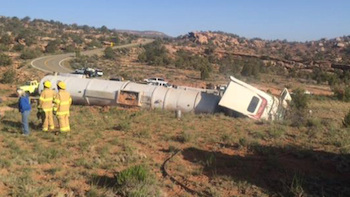A new investigation by Houston Public Media and the Houston Chronicle shows Texas highways are now the nation's deadliest, and fracking is to blame.
Fracking requires thousands of truck trips to haul water, frack fluid and more recently, about 4% of fracked oil.
All the increased traffic has led to more accidents and fatalities. And not just in Texas.
Accidents
A 2014 AP report on roads and traffic fatalities found that fracking requires 2,300 to 4,000 truck trips per well to deliver fracking fluids, which is 33-50% more than conventional methods. With increased truck traffic comes more accidents. US census data in six drilling states shows that in some places, fatalities have more than quadrupled since 2004 — making vehicle crashes the single biggest cause of fatalities for oil and gas workers.
If you zoom in on North Dakota, recently deemed the deadliest place to work by the AFL-CIO, the numbers become starker (via AP):

A tanker truck rolled over in western San Miguel County, Colorado on May 7, spilling
about 8,000 gallons of oil. Photo: San Miguel County Sheriff
In North Dakota drilling counties, the population has soared 43 percent over the last decade, while traffic fatalities increased 350 percent. Roads in those counties were nearly twice as deadly per mile driven than the rest of the state.
Another factor in the specific relationship between oil and gas workers and truck accidents (compared to other industries) is the Federal Motor Carrier Safety Administration's (FMCSA) Hours of Service Oilfield Exception. This loophole allows the oil and gas industry to pressure truck drivers to work longer hours, an obvious safety hazard.
The New York Times exposed the drama and debate of the issue in Deadliest Danger Isn’t at the Rig but on the Road in 2012. Check out the annotated Documents on the Oil Field Exemptions From Highway Safety Rules for ignored testimony from truck drivers and the National Transportation Safety Board, and of course the industry defense, from a failed attempt in 2012 to close the loophole.
Other factors at play in traffic fatalities include truck disrepair and lack of inspection and enforcement. For example, Pennsylvania State Police took 40% of the 2,200 oil and gas industry trucks inspected from 2009 to February 2012 off the road because they were in such bad condition. Lack of inspection, which plagues seemingly every aspect of the industry, hides the full scale of the problem.
For those trucks issued citations, but not pulled off the road, industry has created its own loophole (via The New York Times):
Energy Services, based in Grand Junction, Colo., was cited repeatedly in 2009 for allowing or requiring truckers to drive after the legal limit of 14 hours per shift. The company lost its federal transportation registration and was fined $21,700 in 2010 for various road safety violations.
But soon after losing its registration, Energy Services officials said in court papers that they had teamed up with another company, Energy Specialties, to continue operating with a new federal registration number, crossing out one company’s name and writing by hand the other’s name over it in drivers’ logs.
In sum, safety loopholes for both workers and their trucks coupled with increased demand are putting workers' health and safety and risk, not to mention the environmental risks and risks to other drivers from spills. In April, three vehicles collided in Pennsylvania spilling fracking wastewater and diesel fuel into Chartiers Creek in Washington County. While truck loads are smaller than other those carried by other means, there are still environmental risks associated with truck accidents.
Road Damage
All this increased traffic has a significant impact on roads. A 2013 study published in the Journal of Infrastructure Systems found that a single fracking operation can cause $13,000 to $23,000 in road damage, and taxpayers are left with the bill.
The Energy Policy Forum adds:
…it is recognized across the board by every state where drilling occurs that roads that were designed for 20 years are lasting a mere 5 due to overweight vehicles transporting drilling rigs and water for fracking operations. Further, drillers are not abiding by weight limits. Not even close. Over two weekends in June and September 2010, Pennsylvania State Police inspected 2,300 gas-drilling trucks. Of those, more than 1,600 trucks were given citations for weight limit and safety violations.
Not that I was expecting industry to follow any rules, but to sum up, the oil and gas trucking business is putting workers and waterways at risk, abusing the commons and sticking taxpayers with the bill.
Having a hard time picturing hundreds of industry trucks on country roads? Check out this clip from Groundswell Rising:
